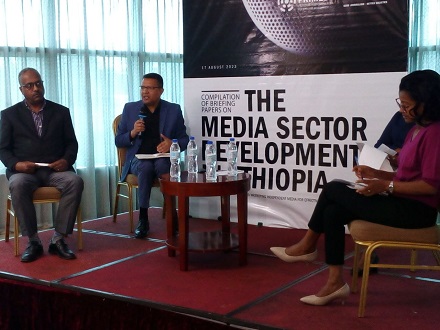By Andualem Sisay Gessesse – News media editors and experts on the media sector today reflect on the discrepancy between the media law of Ethiopia and the practice that has endangered the reform of the sector in one of the countries in Africa known as among jailors of journalists.
Now including non-state actors are involved in detention of journalists against the new media law of the country that relatively gives freedom to media and journalists, according to editors and researchers who reflected on the current state of media in Ethiopia.
Media capture by political parties armed groups such as TPLF and religious organizations have endangered the reform, according to Abdissa Zerai (PhD), who spoke about the state of media regulatory reform in Ethiopia. He made the remark this morning at a half day workshop on “compilation of briefing papers on the media sector development in Ethiopia” organized by the International Media Support (IMS) at the Inter-Luxury Hotel.
He also stated that though the law says political parties doesn’t own media, still including the ruling party are using the media as their property. Such incidents have endangered the reform.
During the weekly Ethiopian Editor’s Guild Meeting, earlier this morning held at the Hilton Hotel, journalists have also shared their experiences in relation to the discrepancy between the law and the practice.
In Ethiopia one of the leading violators of the latest media law that has endangered the reform is the government, which appointed ruling party members as board member of Ethiopian Media Authority about a year ago by practically violating its own law.
Organized efforts are needed by civil society organizations and media associations to pressure the government endorse access to information law and remaining media related laws. Efforts are also required to make public media genuinely public, according to Dr. Abdissa. He suggested that media CSO and associations have to work closely in areas of media literacy, disinformation and related issues.
In his presentation in relation to conflict reporting, Teshager Shiferaw (PhD) has also explained how journalists and media have been biased while reporting conflicts in the country.
Self-censorship, fear of political detention, and loss of job are among the reasons often mentioned by editors as the reasons for conducting professional journalism putting public interest at the center of their reports.
Some experts suggest that in order to improve the media landscaper of the country and advance professionalism, the confrontational approach between the government and media outlets in the country needs to be changed into an advocacy approach by media associations and civil societies to improve the relationship.
Engaging government officials and relevant state actors is vital when it comes to ensuring media freedom in Ethiopia as government is not only regulator but also the major change agent weather ones like or not, according to Elisabet Samuel, one of the panelists who spoke in relation to PRIMED support to media coalitions in Ethiopia.
Solidarity between and among journalists and media outlets will be achieved as a result of the formation of transmedia forum, according to Dr. Abdissa. He stated that such forum can help one journalist from another region of Ethiopia to safely move and collaborate with journalists and media outlets in the region and collaborate, which at the moment is close to impossible.
New Business Ethiopia has learned that the weekly breakfast meeting of editors from both public and private media outlets will continue for the coming few months. Among the main topics of discussions expected include how editors can exercise their professional freedom, reflections on how those profitable public media outlets can push for their institutional autonomy becoming free from political interference, and formation of solidarities among media institutions and editors in the country and beyond.

